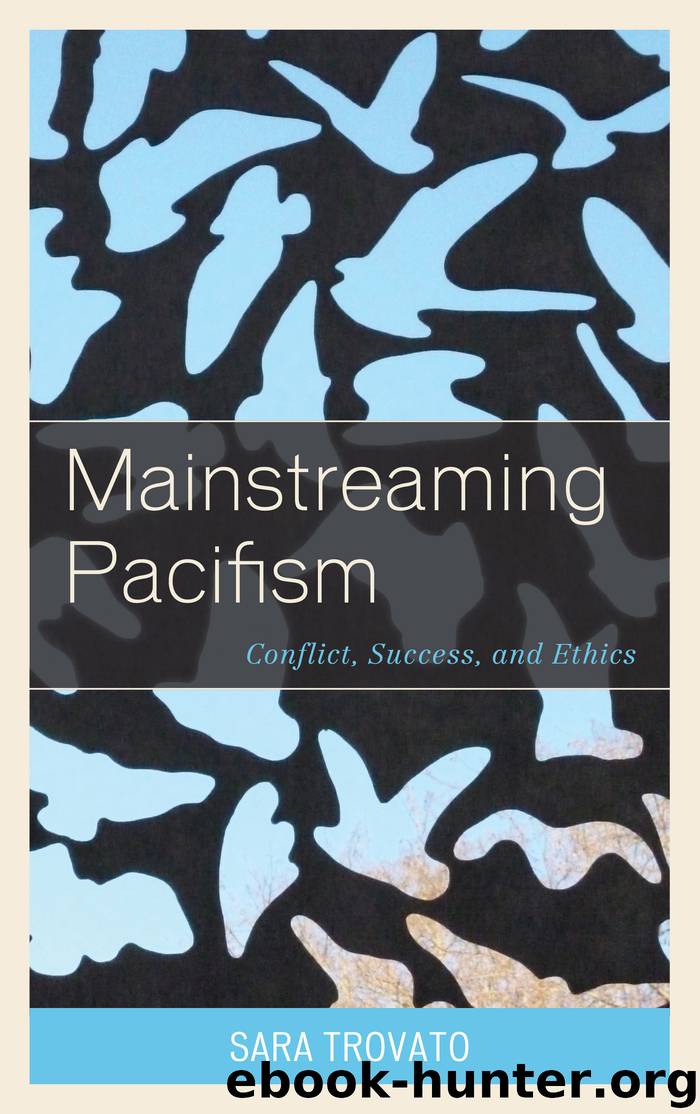Mainstreaming Pacifism by Trovato Sara;

Author:Trovato, Sara;
Language: eng
Format: epub
Tags: undefined
Publisher: Lexington Books
Published: 2012-02-26T16:00:00+00:00
In the spectrum ranging from utopia to effectuality, Marx clearly leaned toward effectuality. But, as the chapter on Machiavelli suggested, effectuality is itself a spectrum, encompassing even utopia (under the heading of ideals) within its lower grades. Marx was so decisive in his resolution to effectively act, as to go for a strong effectuality, and get rid of both utopia and ideals altogether.
A projection dictating how reality should evolve is often acceptable to ineffectual thinkers, but it was not to Marx. In a letter to Ruge, dated September 1843, Marx wrote: “This does not mean that we shall confront the world with new doctrinaire principles and proclaim: Here is the truth, on your knees before it!” (Marx 1975). Marx and Engels had taken notice that the Enlightenment’s theories that had inspired the French Revolution were distant from the revolutionary practice (Engels 1947, part 3, ch. 1). They had negative views about “conservative or bourgeois” socialists (MKP, sect. 3; Engels 1970a), who remained far from the revolutionary struggle of the working class. Accordingly, Marx wrote very little about fulfilled communism (scattered or indirect references are in Marx 1959; 1871a; 1970b), possibly to avoid for it to be thought of as a utopia. Marx and Engels harshly criticized utopian socialism, and differentiated their ideas from it. But when they wrote about communism, they were forced to come closer to utopia. “Very nearly everything that Marx and Engels said about the concrete shape of communist society is based on earlier utopian writings,” Eric Hobsbawm wrote (2011, part I, ch. 2, ii). However, there is a great difference between avoiding focusing one’s attention on ideals and not having ideals. The ideals that Marx left out were speculation, as opposed to an objective movement of historic reality. Unquestionably, because their effectuality may be too small, in some confrontations ideals may fail, and prove to be mere speculation, or merely preaching. But they can be made more effective by combining with other effectual forms. In such a case, they stop being just words and become motivation for action—and motivation to action is something that no revolutionary can do without.
Very skilled a motivator as Marx was, he probably considered aspirations, dreams, and ideals, as things that had always existed, and had not produced any change in reality thus far. Ideals do not fulfill themselves by themselves. They could become, in fact, the worst enemy of an agitator such as Marx was: he envisioned political failure if his theories turned into an impotent dream. Therefore something more was necessary, a theory able not only to claim, but also to obtain, and this was not to be an ought, but a science concerning historic necessity (1955, ch. 2; Marx 1977; Engels 1970a, part 3). Science was needed, and as it could be believed and not only desired, it could animate the fight and the trust in a possible, nay, inevitable victory (inevitability is already present in MKP, sect. 1). Science in Marx substitutes the ideals. All of his theoretical
Download
This site does not store any files on its server. We only index and link to content provided by other sites. Please contact the content providers to delete copyright contents if any and email us, we'll remove relevant links or contents immediately.
| Anthropology | Archaeology |
| Philosophy | Politics & Government |
| Social Sciences | Sociology |
| Women's Studies |
The remains of the day by Kazuo Ishiguro(8959)
Tools of Titans by Timothy Ferriss(8356)
Giovanni's Room by James Baldwin(7309)
The Black Swan by Nassim Nicholas Taleb(7095)
Inner Engineering: A Yogi's Guide to Joy by Sadhguru(6780)
The Way of Zen by Alan W. Watts(6587)
Asking the Right Questions: A Guide to Critical Thinking by M. Neil Browne & Stuart M. Keeley(5745)
The Power of Now: A Guide to Spiritual Enlightenment by Eckhart Tolle(5737)
The Six Wives Of Henry VIII (WOMEN IN HISTORY) by Fraser Antonia(5492)
Astrophysics for People in a Hurry by Neil DeGrasse Tyson(5172)
Housekeeping by Marilynne Robinson(4429)
12 Rules for Life by Jordan B. Peterson(4294)
Double Down (Diary of a Wimpy Kid Book 11) by Jeff Kinney(4254)
The Ethical Slut by Janet W. Hardy(4235)
Skin in the Game by Nassim Nicholas Taleb(4229)
Ikigai by Héctor García & Francesc Miralles(4228)
The Art of Happiness by The Dalai Lama(4118)
Skin in the Game: Hidden Asymmetries in Daily Life by Nassim Nicholas Taleb(3983)
Walking by Henry David Thoreau(3945)
